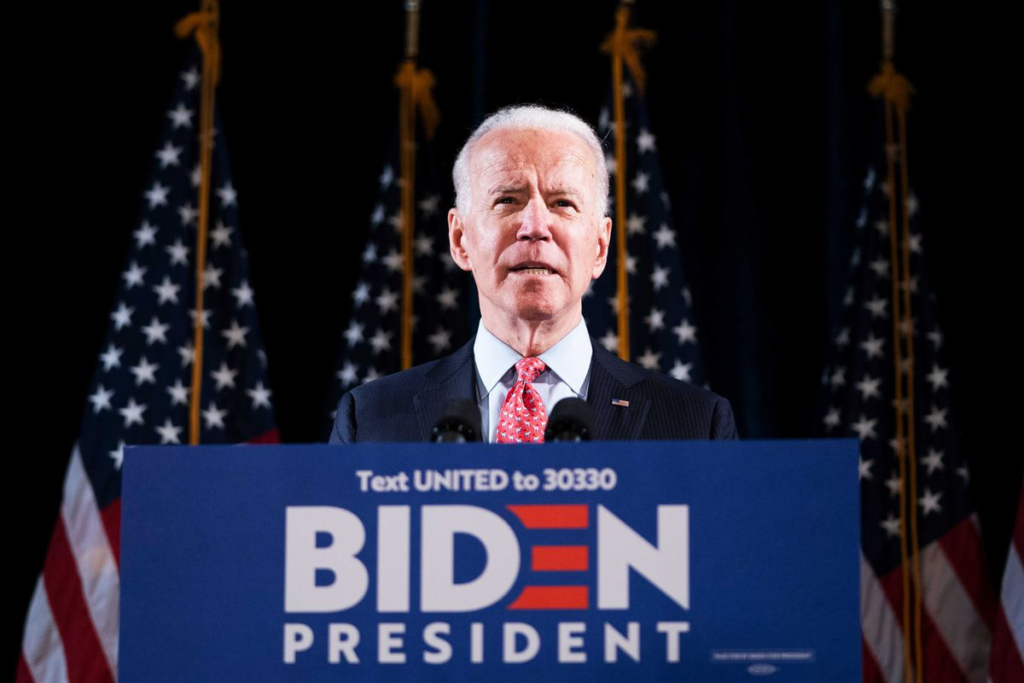Shortening the VP’s Shortlist

Photo courtesy of Vox
By Fernando Cordova
After Senator Bernie Sanders removed himself from the Democratic presidential race and eventually endorsed former Vice President Biden, it has become virtually inevitable that Biden will become the Democratic nominee for the 2020 presidential election. The current delegate count for Biden heading into the Democratic National Convention stands at 1,305. Although he needs 1,991 for the nomination, with Sanders stepping down from the race and recent endorsements from former political rival Senator Elizabeth Warren and former President Barack Obama, Biden’s nomination is highly anticipated. With the 2020 presidential election a little less than 200 days away, the long-awaited matchup between Biden and President Donald Trump is almost here. One question still remains: Who will Biden vet to be his running mate for vice president?
This is a common question that comes across voters’ minds whenever a candidate of a major party gains a majority of delegates prior to reaching a certain delegate threshold. For Hillary Clinton in 2016, it was Senator Tim Kaine of Virginia who made the final cut. For Donald Trump in that same election year, it was Governor Mike Pence of Indiana. There’s a variety of factors going into selecting a running mate for vice president; geographical representation, political following, ideological similarities, experience in governance, status within the party, just to name a few. These factors are not only intended to help the presidential candidate win, but also to govern well.
One thing that is known for certain about Biden’s selection for a running mate is that it will be a woman, which would be a historical event for the nation if he wins the election. In the final Democratic presidential debate that took place last March, Biden committed to choosing a woman to be his vice president.
“If I’m elected president, my cabinet – my administration will look like the country,” Biden said. “I commit that I will in fact appoint – pick a woman to be vice president.”
While Biden has not publicly stated his official choice for a running mate, there has been a great deal of speculation from both politicians and the general public on who his selection might be.
In the days prior to Super Tuesday on March 3, the Senator Amy Klobuchar of Minnesota was one of the first of former 2020 Democratic candidates to endorse Biden while simultaneously announcing the suspension of her campaign. With her endorsement, Biden was easily able to win her home state on Super Tuesday along with a handful of others, solidifying his front-runner status. Due to this partnership and Klobuchar’s strong political history, it is speculated that she may be Biden’s pick for his vice president. In addition to her impressive resume of two terms as the attorney for Hennepin County and President of the Minnesota County Attorneys Association, she has a history of winning in traditionally Republican-held districts. With her moderate stance on a wide variety of issues and being a leading senator in the United States Senate, Biden could possibly win back states in the Midwest that would be vital to his campaign while also being able to work with someone that wouldn’t be ideologically at odds with him.
Another prominent figure with the potential of being asked to be Biden’s running mate is California Senator Kamala Harris. Harris has been considered as a front-runner vice presidential pick for Biden since she dropped out of the primaries in early December 2019. Despite their sparring on the debate stage in the first few Democratic primary debates over Biden’s past comments on segregationist senators and bussing, she remains one of his most dedicated supporters and a possible choice to be his running mate. Aside from serving as attorney general for the state of California prior to her senate bid, she’s one of the leading African American officials in the country. Choosing a person of color would also prove vital to Biden’s campaign. Following his endorsement of the former vice president, House Majority Whip James E. Clyburn was quoted saying in an interview by the Financial Times that he wanted “a black woman to be on the 2020 presidential ticket.” With endorsements from the Congressional Black Caucus and several minority leaders on the state and federal level, Kamala Harris might be what Joe Biden is looking for.
Governor Gretchen Whitmer’s handling of the COVID-19 pandemic in the state of Michigan has drawn national attention for both good and bad reasons. Despite this, however, she brings along essential talents and gifts that could help Biden in the long run. Witmer’s experience in governance is nothing shy of noteworthy. She served as a state legislator for more than a decade, being the Senate Minority Leader for four years prior to her gubernatorial bid. This would prove to be a huge asset for her since experience is one of those checkpoints that Biden is looking for when it comes to his vice presidential pick. In addition, choosing Whitmer to be his vice presidential nominee could be key to winning back the critical Midwestern states come November. In 2016, Donald Trump won Michigan by less than a quarter of a percentage point. With her election during the 2018 midterms, Whitmer has proved that she possesses the same skills that Klobuchar has of winning where President Trump has as both a woman and a Democrat.
Sen. Elizabeth Warren has also been seen as a top contender to be Biden’s vice presidential nominee. By having a high profile in the senate and having run against him during the Democratic primaries, selecting Warren to be vice president would be a smart move for Biden if he wants a large portion of the progressive vote and possibly a number of Bernie Sanders supporters to back him. In addition, she’s no stranger to the former Obama/Biden administration, having served as assistant to the president and being a strong advocate for the creation of the Consumer Financial Protection Bureau. However, Warren could also prove to be a risky choice when it comes to governing the country. Something that Joe Biden emphasizes to be a huge importance for him when it comes to his vice presidential selection is ideological similarities. For example, when asked about Medicare For All at an event in New Hampshire and whether or not he would choose either Sanders or Warren to be his running mate, he replied saying that he was conflicted with senators’ proposals for universal healthcare, “There has to be some correlation between their views and mine.” However, that doesn’t mean Biden isn’t willing to work with Warren on a couple of compromises. The Biden campaign announced recently that he would adopt Warren’s bankruptcy legislation to his platform, proving that he is willing to cross ideological lines.
No matter who Joe Biden selects to be his vice presidential nominee, it will be the 3rd time in our nation’s history for a woman to be nominated to the position on a major party ticket. Not only will this be historic for the country but also a huge step forward in American politics as a whole.







